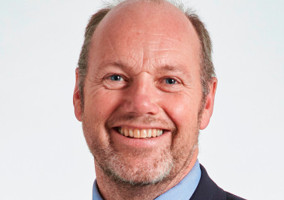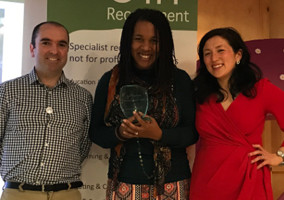Social media is a powerful weapon in the right hands. During the Windrush scandal earlier this year, David Lammy MP used his Twitter and Facebook presences to campaign against the deportation of Commonwealth migrants, ultimately leading to the resignation of the home secretary and the government issuing a formal apology. In this day and age is social change even possible without social media?
That’s the message for our sector as we open nominations for the sixth Social CEOs awards. We are proud that last year’s winners included Deborah Alsina of Bowel Cancer UK, Matt Hyde of The Scout Association and Peter Wanless of NSPCC, with the awards reaching 2.5 million people on Twitter alone.
Once again our judging panel will choose an overall winner from the top 30 CEOs. Their aim is to recognise charity leaders who are excelling online, and they will be making individual awards for the best trustee, senior leader, and rising star on social media.
Following the successful introduction of two new awards last year for Best Digital CEO and Best Digital Leader (who could be a trustee, director, or head of), we will be introducing two new awards for Best Digital Trustee and Best Digital Champion. The digital category awards are for those whose leadership has helped their charity take strides forward in digital. For the Best Digital Champion award the judges are also looking for nominees who have championed the role of digital across the sector they work in. The panel are keen to see stats and examples to support this, as these are more holistic than the social categories. Nominations are open to leaders from registered charities of any size or cause, and we would like to have a diverse range of applications.
We asked 2017’s winners how social media has helped them. Here’s what they told us.
Think engagement first
Matt Hyde, chief executive of The Scout Association, told me that building relationships with volunteers, members, donors and supporters is a key part of any chief executive's role, and using social media for this can be an efficient way to achieve multiple goals. “Social media allows you to both broadcast organisational messages and transforms dialogue with stakeholders. It can be used to thank and champion people as well as dispel myths,” he told me. Telling stories and making it personal demonstrates your human side as a leader and can be more persuasive than a corporate message.
Here's an uplifting story to start the day - well done Toky #skillsforlife 'Boy, 10, comes to the rescue after his dad collapses and has a seizure' https://t.co/2OvGAYqBsc
— Matt Hyde (@matthyde) August 30, 2018
Build networks and collaborate
Polly Neate, chief executive of Shelter, believes that CEOs must be visible online given that charity leaders are under scrutiny, stating that “there's a responsibility to be transparent and authentic, particularly at a time when a lot of people are asking what on earth charity CEOs do for their money. The answer to this should not be a mystery.” Being visible has unlocked the benefits of social media for Neate: “I have made countless contacts, many of which have led to exciting projects and innovation, and have discovered funding opportunities (which have translated into actual money!). It's also helped me to develop my support network and find people in similar roles who think as I do. This is vital because the CEO role can be quite isolated sometimes”
Varied & fascinating days like this are a huge privilege of a job like mine @Shelter - discussing housing crisis with @Barratt_Homes then our new internal activist training from @Bryn__Phillips and last stop a meeting on the #lobbyingact with other concerned #civilsociety CEOs
— Polly Neate (@pollyn1) September 3, 2018
Kirsty Marrins, 2017 winner of Best Trustee on social media has also found these channels useful in her role on the board of the Small Charities Coalition. Marrins told me that, “I love how social media is borderless, meaning I can chat to peers around the world. Having those different perspectives is not only refreshing but also really helpful.”
Keep your ear to the ground
All the charity leaders I spoke to enthused about how social media helped them stay on top of the latest news in their field and develop their thinking. Michelle Hill, chief executive of Talk Listen Change, and Andy Broomhead, head of volunteering at Diabetes UK feel that this has saved them time and increased their confidence.
1)Social media has helped by: keeping me updated with new policy developments & fundraising opportunities (both of which are hard to do as a small charity CEO), widened by network of contacts (I’ve met people I only knew in the twittersphere in real life & realised we’d already
— Michelle Hill (@TLCCEO_Michelle) August 15, 2018
I've learned I'm not the only one in the boat sometimes and that being more open about some of the challenges means I can sometimes help those in the sector with that they're trying to achieve too
— Andy (@BroomOwl) August 15, 2018
Digital is upping the ante
As our wider digital awards show, digital is changing the way charity leaders work. Neate believes digital requires “the capacity and capability for swift decision-making and action, and that means your underlying systems, rules and frameworks must be very clear and understood at all levels in the organisation. For example, delegated authorities must allow for flexibility and rapidity. That means boards and senior execs need confidence that wise decisions can and will be made without their sign-off in some cases, and will require them to be available and quick-thinking in others.”
Social networks have been involved in controversy over harmful and misleading and content this year, but surely this means that charity leaders need to be more prominent, not less. Being ambitious online and using these channels to achieve their charity’s goals could help the sector grow its role as a bold, brave voice in uncertain times.
Nominations can be made here - www.socialceos.org/nominate
Nominees will be judged by a panel of voluntary sector leaders and the results will be announced on Wednesday 7 November. All entries must be received by midnight on Friday 28 September.
Civil Society is the media partner for the awards.
|
Related articles












